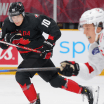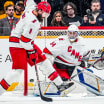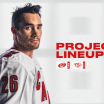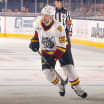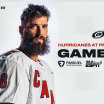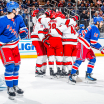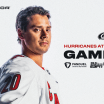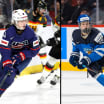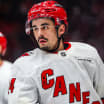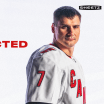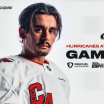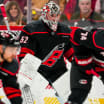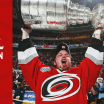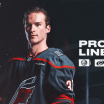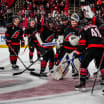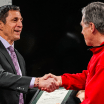As North Carolina and numerous other states begin to slowly reopen amid the COVID-19 pandemic, so too inches forward a plan for the National Hockey League to resume the 2019-20 season.
On Friday, the NHL Players' Association
announced an initial approval
of a 24-team return to play format, a plan hammered out by the joint Return to Play Committee over the last few weeks. Two teams voted against the proposal, and the Carolina Hurricanes were one of them, Jordan Martinook, the team's PA representative, confirmed on Monday.
It's not that the Canes don't want to play, he stressed. But there were some reservations about the format, and Martinook and the team wanted to make those concerns known.
The bottom line, though, is that the Canes are excited to eventually return to the ice, and they know their ultimate goal remains unchanged.
Progress Made in Plans to Resume 2019-20 Season
Martinook expresses both reservations and excitement for proposed return to play format
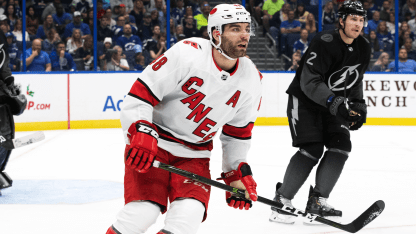
"It's going to be good for the game. It's going to grow the game. It's going to keep lots of fanbases in it. We want to do anything to keep people excited in the times we're in. We're not looking past that as our team," Martinook said on a video call. "We want the NHL to do the best we can and the players to help the world so that people can rally around something. It wasn't like we didn't want to play or anything. We felt like this particular option maybe didn't benefit us, and it's not going to benefit every team."
While the finer details are still to be determined, the basic structure of the proposed 24-team format, based on what's been reported, would see the bottom four playoff teams in each conference square off with the four teams on the outside of the cut line in an abbreviated, likely best-of-five, series. This would pit the Canes against the New York Rangers.
The expanded field is an inevitable biproduct of having the regular season suddenly cut short, the play-in concept existing in lieu of potential standings races playing out in the final three weeks of the season.
As with any artificial construct, though, there are flaws, and these flaws happen to disproportionately affect the Canes.
At the time of the pause, the Canes had collected 81 points in 68 games (38-25-5). They occupied the first wild card spot in the Eastern Conference and were looking at playoff odds around 80 percent.
Under this proposed return to play format, those playoff odds significantly decrease when it comes down to what is essentially a coin flip, a shortened series against the Rangers, a team the Canes went 0-4 against this season. There's also the tough obstacle of now having to win four series just to get to the Stanley Cup Final.
"We're fine with the way that it's going to go."
"It just kind of limits our odds and makes you play another playoff series, basically," Martinook said. "It wasn't just for our team's situation. … You look at teams that had a 10 percent chance to make it, and now they're pretty much on a 50-50 playing field."
Then there is the question of what could have transpired in the final weeks of the regular season. At the time of the pause, the Canes were riding a three-game winning streak that included victories over two divisional opponents. The team seemed to be hitting its stride at the perfect time, maybe even playing its best hockey of the season, and you have to wonder if a push up the standings would have been possible.
"I'm not taking anything away from the top four teams … but we felt like we could have kept climbing the ladder," Martinook said. "It doesn't really benefit the teams in 5, 6, 7 or 8, it kind of hinders those teams. Then, it gives a lot to the 9, 10, 11 and 12."
These are all true and valid concerns, and the Canes made them tangibly known with their dissenting vote on the return to play proposal.
At the same time, Martinook and the Canes understand the practical and logistical limitations of the current climate.
"There's probably not an ideal return to play scenario]. The ideal one would be you could finish all 82 games and go into playoffs, but we're not in those circumstances," he said. "It's an accelerated time frame, and they needed to think of the best thing for the league."
With that in mind, the Canes are looking forward to when the puck drops once again.
"We're fine with the way it's going to go," Martinook said. "You're going to have to win to win. We're fully prepared with what we've got moving forward."
Martinook's conference call coincided with the NHL's announcement of intent to move into Phase 2, in which players are permitted to return to club training facilities for voluntary small-group on- and off-ice workouts. The league is targeting "a date in early June" for this transition out of the self-quarantine phase, though an exact start date or an estimate on how long Phase 2 might last have not yet been determined.
"As players, we were just kind of playing the waiting game here in limbo," Martinook said. "It's nice to finally get Phase 2 potentially going and have an idea that we're going to be coming back."
With the impending transition to Phase 2 comes
[an extensive document
that outlines protocols and procedures necessary to protect the health of the players and staff.
"I think it can be done safely. … I don't think they would let us come back if it wasn't safe," said Martinook, who is already weighing options of a return to Raleigh, with or without his wife and young son. "Safety is definitely the main key. They want to keep going, but they don't want anybody to get sick in the process of that, and it doesn't look good if we come back and a bunch of guys get sick."
As the plan to returning to play progresses slowly but surely, one thing is certain: The hockey on the other side of it will be a bit different. There probably won't be any fans. Perhaps players will be required to wear full-face shields. Maybe there will be an effort to limit scrums. And the playoffs will certainly have a new, unprecedented twist.
But, it will still be playoff hockey. It will still be competitive. It will still be emotional. It will still be thrilling. And the the greatest trophy in all of sports waits at the very end.
"It's definitely a unique year, and that's just what we're in for," Martinook said. "I know everybody on our team wants to win and wants to come back and play."

